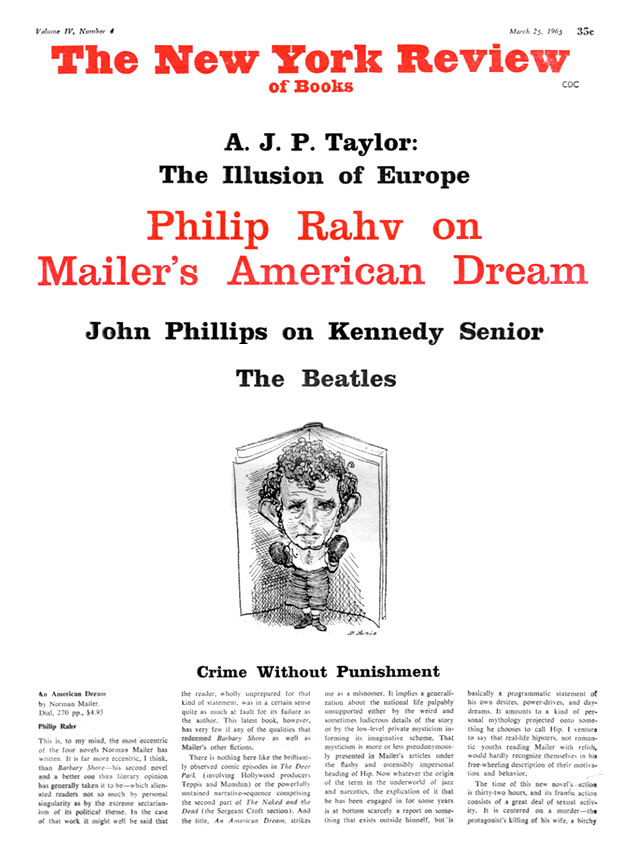In response to:
The Need for Negro Politics from the February 11, 1965 issue
To the Editors:
One wonders if reviewers ever read the books they review. Laura Carper’s compendium review of four books on civil rights was a convenient way for her to ride her own hobby horse on the subject. As a review of Howard Zinn’s SNCC: The New Abolitionists it was worse than a failure. Snide (“Mr. Zinn contents himself with writing about the Freedom Rides which were organized by CORE…”), “patently false (“[Zinn] gives us no insight into SNNC’s [sic] political orientation nor any understanding of its tactics…or, indeed, its leaders….”), and distorted ([“Zinn] argues that SNNC [sic] is not political and is free from ideology….”). Miss Carper’s comments simply do not refer to the book she pretends to review. Explicitly noting the role of CORE in organizing the Freedom Rides, Mr. Zinn discusses them in terms of the later SNCC leaders who took part in them and the effect of that experience on them. Of course the lunch counter sit-ins occurred before SNCC was formed—that’s the point. Mr. Zinn, carefully, imaginatively, analytically, traces the organization of SNCC. He does not talk of it as a “spontaneous combustion,” but rather, for the first time, shows us who founded it, how, when and why: where the money came from, who the guiding spirits were, etc. In short, he offers us a brief but informative history of how this particular organization was formed. That is only part of what he does.
The bulk of Mr. Zinn’s book is devoted to giving just those insights Miss Carper, for reasons totally obscure to me, denies are there. No other book on the civil rights movement that I know of has discussed the young people in SNCC, or CORE for that matter, in the biographical detail Mr. Zinn does. Nor has anyone tried to relate the insights of psychologists like Erikson to an understanding of what motivates young civil rights workers. Miss Carper may not find Mr. Zinn’s insights helpful or particularly interesting; but how in the world can she deny they are there? The whole point of Mr. Zinn’s effort is to go beyond factions; to understand in depth. Mr. Zinn’s final chapter is devoted to a discussion of the current tactics and strategy of SNCC, the problems it is likely to encounter, the possibility that SNCC “can…develop more sophisticated tactics as situations change.” He discusses, more convincingly than Miss Carper, the possibilities for “the creation of a new populism in the South, linking black and white people on the basis of common interests.” Mr. Zinn’s failure to discuss the specific case of the FDP at the Atlantic City convention is a natural one—it occurred well after his book had gone to press.
A review which does not go beyond the immediate book reviewed perhaps does less than its proper job. But one, like Miss Carper’s, which ignores the book altogether, or which gives such a distorted version of that book as to be completely unrecognizable to anyone who has read it, is an insult both to the author and the reader.
Marilyn B. Young
Hanover, New Hampshire
Laura Carper replies:
Some people allegedly do not read the books they review, some people do not read the reviews they criticize, and at least one does neither. Miss Young makes my point well. There is a wealth of personal data and psychological insight in Howard Zinn’s book. They are not substitutes for politics. More important, they are not “beyond factions.” I think that the civil rights movement needs a thorough discussion of politics. Biography and psychology are different and valuable means of ordering experience. Our priorities today are of a different kind. Mr. Zinn would have written a more pertinent book had he been more explicit about the possibility of a new populism, had he included more than the one sentence quoted by Miss Young on more sophisticated tactics and discussed SNCC’s political orientation to specific problems. I did so in connection with the FDP. He could have done so in any context meaningful at the time he wrote the book.
An organization’s political orientation is not defined by the stability of its membership, but by its position on political questions. Mr. Lisker must surely know that. He argues further that SNCC neither has nor needs an ideology. I did not argue for ideology. I argued for a political and economic program. The failure of the old abolitionists was a failure to develop a program self-serving to the Negro. Those few who argued for “forty acres and a mule” recognized that unless the Negro’s freedom was economically secured it would be jeopordized. Their failure to prevail left room for the wave of Negro oppression that followed reconstruction, and from which the Negro suffers to this day. Without an economic base to their freedom the Negro’s civil rights were destroyed with relative ease. Should the new abolitionists fail again to develop concepts from which to draw a political and economic program (this time appropriate to an industrial society), they remain open to the same social betrayal they are now seeking so courageously to redress.
This Issue
March 25, 1965


